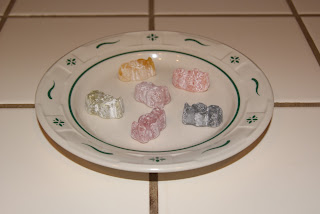Does anybody remember The Land Before Time? The
movie with the anthropomorphic dinosaur hatchlings? One of Steven Speilberg’s
efforts to get Don Bluth to make animated movies akin to the Disney movies of
the 1940s? The really good animated movie that got a ton of “so-so” sequels (though
I really liked the ones with Chomper in them; Chomper adequately challenges the
status quo, and he’s just loveable in general)?
As an adult, I probably should have forgotten about it.
But as a student of animation, I can't.
This is a movie, more than almost any other, that is
subject to internet theories, a most especially common one being that the
earthquake killed them all and they are all in Heaven.
However, this is not the theory I’m going to present. This one, and so many other “death” theories
and “alternate take” theories have been done so many times. It’s time to do something completely
different.
My theory is that Littlefoot, the soft-spoken sauropod
main protagonist, is actually adopted.
Hear me out:
In the very beginning, we see a sauropod herd in a
swamp. There is a nest, with a lot of
broken eggs; perhaps some hatched, perhaps others were poached (sadly, most
look poached). There is one whole one
left, trying to hatch.
But it’s not safe for him: A nearby ornithomimd (the
script labels it Ornithomimus, but the design is the same used for
Struthiomimus in later sequels, so I’m just labeling it as an “ornithomimid”) has
other plans. Ornithomimids were believed
to be egg-eaters back then, and their diet is something of a mystery, though most
of them were probably primarily herbivorous.
Given that the dinosaurs in this movie have eyelashes,
a feature I can assure you that most dinosaurs most probably did not have, and
the movie admitted that most of them were starving anyway (herbivores such as
deer and horses have been known to make drastic dietary decisions during
famines), total accuracy is probably irrelevant here.
What is relevant is that as soon as the Ornithomimid
tries, the sauropod mother shows him how it feels to be a baseball with her
neck, but in the process, the Ornithomimid drops the egg over a parasaurolophus
skeleton (given that the dinosaurs in this movie are sapient, this is kind of a
morbid sight, like seeing a human skeleton), then falls into brambles, plunks into
a river, and over a waterfall…how could his biological mother trace this egg
after this point?
Nevertheless, he is soon found by a group of sauropods,
who claim him as their own, and dub him Littlefoot, likely after his foot
bursting out of his egg, leading to a ridiculously adorable and heartwarming
scene. But how on earth did they know
where to find him?
…Unless, perhaps, they actually didn’t know
where to find him, that the mother we see wasn’t the same mother, and happened
upon him by mistake and miracle, subsequently adopting him into their family. Perhaps they are not related at all outside
of being similar Sauropods, and seeing his egg showing up by mistake as a
beautiful miracle, they adopt him into the family.
“What about Bron?” some might ask in reference to
Littlefoot’s father, who was introduced in one of the later sequels (The
Land Before Time X: The Great Longneck Migration, to be exact; like the
Chomper entries, this too adequately challenged the status quo). They might further ask, “Isn’t Bron all the proof
that we need that Littlefoot’s mother is biologically related to him, and the
real source of Littlefoot’s name??”
Well, first of all, we’re not actually entirely taking
the sequels into account, and secondly, even if we were to take all of the
sequels into account, why can’t Littlefoot count his mother’s mate as his
father anyway? Again, biological relations don’t dictate familial ones. The husband of your adopted mother can still
be your father. His mother wasn’t the
one who gave birth to him, but rather who raised him; likewise, his father
doesn’t need to sire him to be his father, he was with Littlefoot’s mother and
was willing to have a familial relationship when Littlefoot approached him. That’s father enough for me.
If Universal’s staff want a good sequel idea, the
story could be about Littlefoot approaching his biological family, finding them
again, perhaps even encountering his biological siblings, and realizing that his
biological mother was hardly qualified to be a parent, leaving her prior eggs
to be devoured by ornithomimds. This
irresponsible, useless mother might even be negligent to Littlefoot’s currently
living biological siblings to this day.
Upon realizing this, and realizing what a real family is, he returns to
his adopted family, to his grandparents, and to Bron (so a bit like Shazam!,
but with animated dinosaurs. With
eyelashes).
See? Things can go back to exactly being the same as
before, and still the formula and status quo are adequately challenged, just
like with the few good sequels. Heck,
such a premise would somewhat justify why things keep going back the way
they were before: Because changing them isn’t guaranteed to work.
Also, the songs should either not be present (since
the first movie didn’t have any, and it was just fine without them) or have
less of an “Irish trabadour band” vibe like some of the sequel songs did, and
should have more of a “Disney” vibe.
That way, they would be slightly less embarrassing when your dad
spontaneously sings them (with changed lyrics) during unusual times.
Trust me on this one.
It’s absolute fact. It’s happened
a lot of times at home. I’ve heard far
more variations of “Friends for Dinner” from my dad than any human being ever
needs to be subjected to. He also says
“eggs, dear boy” whenever he makes anything involving eggs. If you want him to always talk normally,
never allow your father near any of The Land Before Time sequels.



